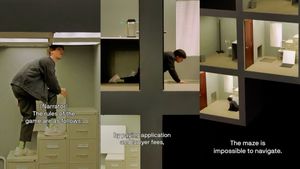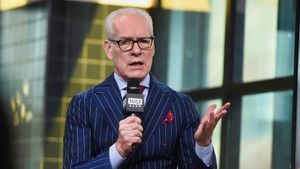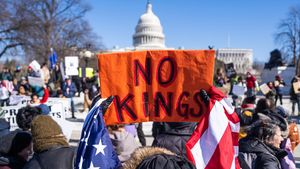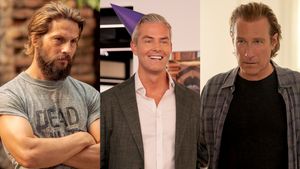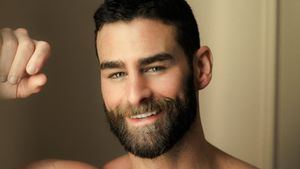World
CONTACTAbout UsCAREER OPPORTUNITIESADVERTISE WITH USPRIVACY POLICYPRIVACY PREFERENCESTERMS OF USELEGAL NOTICE
© 2025 Equal Entertainment LLC.
All Rights reserved
All Rights reserved
By continuing to use our site, you agree to our Privacy Policy and Terms of Use.
We need your help
Your support makes The Advocate's original LGBTQ+ reporting possible. Become a member today to help us continue this work.
Your support makes The Advocate's original LGBTQ+ reporting possible. Become a member today to help us continue this work.
General's orders
Retired four-star general Wesley Clark thinks "don't ask, don't tell" needs to go and same-sex unions are here to stay. Can these pro-gay positions win him voters' support--and the Democratic presidential nomination?
Former Advocate senior news editor Jon Barrett lives in New York City
It has been more
than 10 years since a Democrat from Little Rock, Ark.,
first took on the military's ban on gay service
members, winding up with a compromise that was quickly
dubbed "don't ask, don't
tell." Now another Democrat from Little Rock is
tackling that compromise, saying it clearly doesn't
work and must be dismantled. As president, Gen. Wesley
Clark is prepared to fix what his former commander in
chief, Bill Clinton, left broken.
In a testament to how much has changed in the
decade since "don't ask, don't
tell" was born, all nine of the Democratic
presidential candidates who are currently elbowing their way
across the country say the policy is discriminatory. But the
59-year-old Clark, a retired four-star gen- eral and
former NATO commander, could be the only one with
enough brass to make a difference. As Steve Rawls of
the military watchdog group Servicemembers Legal Defense
Fund explains, "Military leaders will have a
lot of sway in convincing Congress to change the
policy, and General Clark obviously has a lot of stature
within the military community."
But first The General, as his aides all refer to
him, must win the nomination. To accomplish that, the
campaign has a lot of work to do, admits spokesman
Matt Bennett during a break from campaigning in New
Hampshire in order to stump in New York City.
"We're running a 12-month campaign in
nine months," Bennett says.
The Clark campaign was sprinting in New York
City, squeezing in an interview with The Advocate
during the hour-long commute between New
Jersey's Teterboro Airport and a meeting on Wall
Street. From there Clark took a rush-hour subway ride
to a midtown Manhattan hotel--the same one where
he met his wife, Gert, at a USO dance 39 years earlier.
There he posed for photos to accompany this interview while
two aides, sitting just off-camera, helped him
rehearse his speech for that night's
million-dollar fund-raiser, hosted by Meryl Streep and
Anthony Edwards.
It's easy to get the sense that this is
the pace with which the general is most accustomed.
Born in Chicago in 1944, he was the only child
of Benjamin Kanne and his wife, Veneta. After his
father died when Wesley was 4, he and his mother moved
to Little Rock, where she married Victor Clark a few years
later. Clark was 23 before he learned that his
biological father had been Jewish. His mother
didn't tell him of his heritage because, in
part, she thought he already faced enough discrimination as
a Yankee.
After Clark graduated first in his class at West
Point and earned a Rhodes scholarship to Oxford
University, he and Gert married in 1967. They raised
son Wesley Clark Jr., born in 1969, in 31 homes as Clark
pursued a career in the Army, which included volunteering
for combat duty in Vietnam (where he was shot four
times), leading the U.S. Southern Command in Panama in
the mid '90s, and commanding NATO in Kosovo
during the Balkans war. In December he testified at The
Hague against former Yugoslavian president Slobodan Milosevic.
Clark admits that throughout his 34-year
military service and his subsequent jobs as an
investment banker and CNN commentator, he had little
reason to delve into gay issues. In fact, he says he
didn't know an openly gay person until the
1990s. Nevertheless, the campaign has provided him a
crash course as the Massachusetts supreme court decision
rocketed same-sex marriage into a top election
topic--where the gays-in-the-military issue has
been since candidate Bill Clinton raised it in 1992.
Clark spoke to The Advocate the day after
Al Gore endorsed the candidacy of former Vermont
governor Howard Dean--a move that Clark shrugs
off as having more to do with Gore than with
Dean--the same day two retired brigadier generals and
one rear admiral came out of the closet in The New
York Times [see page 26], a move Clark says deals
significant blows to "don't ask,
don't tell."
When it comes to gay issues, what makes you a
better presidential candidate?
I've been in the armed forces. I've been
at the very center of the firestorm. I know what
it's like out there. And I've had people
who have come up to see me about it since I've
been out [of the service]--gay and lesbian people who
need help.
What are they saying?
They tell me that they want it fixed, and I agree. The
armed forces are the last institution in America that
discriminates against people. It ought to be the first
that doesn't. They ought to have the right to
be who they are. They shouldn't have to conceal their
identities. You know, there are different models [that
allow for gay people to serve openly]--the
British have a model--and there is no impact on
combat readiness. It's a bogus issue.
Is there a model you prefer?
The model I prefer is to call on the leaders of the
armed forces and say, "You have a problem,
gentlemen. Please fix this." And let them come
up with a new model. You've got to get the people in
leadership to have a stake in the position that comes out.
Do those people have a stake in "don't
ask, don't tell"?
They fought vigorously for it. But these aren't
the same guys [in the Pentagon leadership today]. That
was like four generations ago. Times are changing in
the armed forces, just like they've changed in America.
Did you see the story in The New York Times today
about the retired brigadier generals and rear
admiral who came out of the closet?
No, but I heard about it. I didn't see it, though.
Let me show it to you.
[Reading] I don't think I knew them. This is a
horrible thing that these guys had to live and conceal
who they were, though.
What's your reaction?
I'm glad they came out. It will help move the
policy forward. I think it's outrageous. If
they had this policy in place during Vietnam, there
would have been nobody in the Army. You wouldn't
have had to fake a medical condition. You could have just
said, "I'm gay." And what would
they have said--"Prove it"? They
put [the ban] in place when we became an all-volunteer
force. I first heard about it in 1981. I remember a
company commander coming to me and saying, "Sir,
I've got this really great soldier who is
introducing us to this guy and calling him his
boyfriend. And we're going to have to throw him out
of the Army." And I said, "Why do you
have to throw him out? I don't
understand." He said, "There is a new Army
regulation that came out." We checked on it, and the
guy had to leave the service.
Did you know people in the service who were gay
before then?
No. There were always rumors--especially with the
Women's Army Corps. But nobody ever knew. In
the units I was in there were--as far as I
knew-- no efforts to make people expose their
sexuality. We never sent people to check gay bars and stuff
like that. Soldiers had a right to their private lives
as far as I was concerned. But there were some people
who confessed. I interviewed one of them--a
woman. She wanted out. And I had to say OK. There is no way
around it. It's in law.
Can you imagine a situation where knowing
someone's gay would affect unit cohesion?
No. One of these officers came up to me and said,
"Sir, I heard what you said about gays in the
military, and I have to tell you, I have some problems
with it." And I said, "Pete, let me ask you a
question. If your son or daughter were gay, would you still
love them?" And he said, "Yes,
sir." And I said, "Would you still want
them to be treated with the same rights as everyone
else? Or would you want them to be discriminated
against?" Then he said, "OK, OK, I see
where you're headed. I understand now."
And it's really that simple.
During a debate in Boston you talked about how
"don't ask, don't tell"
works in some cases and how it doesn't work
in other cases. What did you mean?
It works in some cases as it's designed to work.
That is, it works if people can suppress their
feelings and not be seen. Then there are other cases,
where people just want to be with people like
themselves. They just want to be able to tell who they are.
As far as I know, we never had MPs go out to gay bars
to find people. But there are other units, like the
Air Force and Navy, where they have every gay bar
staked out with special investigators. It's one of
these gray areas where they say, "We
didn't ask him, but he's here.
He's giving all evidence of homosexual behavior, and
he is associating with these people. And by Navy
regulations or Air Force regulations or by
instructions we have received, we have to ask him,
'Are you gay?' " And boom,
that's the end of the policy. You can't
do that to people. But you know, even where it works,
it's wrong. That's what I want to say.
It's not OK to make people suppress their feelings?
No, I don't think so at all. I think the supreme
court decision in Massachusetts was the right
decision. I think that people who want to form a
contractual relationship--whether they are same-sex or
different-sex--should have exactly the same rights and
responsibilities. So it's joint domicile, rights of
survivorship. One of the clearest cases is hospital
visitation. I mean, how dare they tell gay people who
are hospitalized that their loved ones can't
visit them? That's outrageous. But it happens all
across America. So those things have to be absolutely
fixed. And the sooner the better.
Speaking of marriage, I know your son was married
recently. Let me ask you the same question you asked
that officer: If your son had been born gay, would
you want him to have the same rights that he
enjoys today?
I would want him to have the right to have a stable
relationship. But whether you call it marriage or not
is up to the church or the synagogue or the mosque.
And it's up to the state legislatures. I think
marriage is a term of art. It's a term of
usage. But the legal side of it is not: It's
not negotiable.
But about 40% of U.S. marriages every year happen
without any religious participation.
I support whatever the state says. If the state of
Massachusetts says we're going to form a civil
union but we're going to call it marriage, then
as far as I'm concerned, that's marriage.
And what about the federal rights that come along
with marriage?
They come.
Immigration?
Absolutely.
Social Security?
Absolutely. Whether or not it's called marriage,
those rights come.
So you support Massachusetts's calling it marriage?
Yeah, absolutely.
How do you think Congress would react to that?
Well, they'll love it. This is exactly what
they're looking for. Newt Gingrich and Tom
DeLay and all those guys are looking for a real hand
grenade to throw into the Democratic Party. It's an
absurd issue, and it's one of the reasons I'm
running. No one can accuse me of being soft on
defense, and no one can accuse me of not knowing about
what the armed forces are about. And when I say,
"It's OK," then it's OK, period.
But elections aren't always about common sense.
And I think [Republicans] would love to frighten
people.
So do you think marriage could be a successful wedge issue?
I think that it depends on who the candidate is. I think
it will certainly be pushed as a wedge issue by the
Republican Party.
More so if Howard Dean were the candidate?
You'll have to draw your own conclusions on that.
If Massachusetts says that a civil union between two
adults of the same sex is a marriage and that it
should be called marriage, then that will promote a
ripple effect of acceptance or rejection across the United
States. It will make this a much more potent political
issue. And it will reverberate for two or three or
four years, depending on factors in the political
system and so forth.
I just haven't thought it through that
way, though. For me, it's not about political
calculation. It's about the way I think that we
should handle this as a matter of public policy--with
equal rights in law. And you have to allow
people--without it becoming a national election
wedge issue--to say, "You know, my son is
in San Francisco and he has formed a civil union. We love
him and we really like the man he's living
with--he's a really good guy--and
we want to call their relationship a marriage."
And when the little old ladies say that in churches
across America, then the ministers will say, "You
know, you're supposed to love your neighbor as
yourself and you shouldn't discriminate against
people." Eventually society changes--just
as it has in the past. We'll get to that point.
But in the past, when the country was struggling with
whether or not to allow people of different races
to marry each other, for example, there
wasn't a question of calling it something other
than marriage.
The way Colin Powell said it is that it's like
the decision that President Truman made [to
desegregate the military] and the decision that he was
asked to make [to allow gay people to serve openly]. He said
that there is something fundamentally different with sexual
orientation. I'm not sure that's
correct. I'll start with the legal rights.
Let's let convention take its course as it works through.
What role did growing up in Little Rock, Ark., have in
your support of civil rights?
I grew up in a very conservative household. My
stepfather was a die-hard Republican. He was a banker.
He couldn't stand FDR, whom he called
"Roo-o-osevelt." So what I saw when I was
young was that civil rights was something that was
ripping the country apart and it started in Little
Rock, Ark., which was the epicenter of the earthquake.
And I didn't understand it.
Were you old enough to understand what was happening at
Little Rock Central High School [when it was
integrated under police guard in 1957]?
No, I was in the eighth grade. I didn't get it.
All I got was that there were all these big and
important Northerners, these Yankees who would come
down and pick on us poor people from Arkansas.
When did you start to support the efforts of those Yankees?
After I got in high school and realized that people are
people. But you know, people don't like to be
forced to do things. If you could get them to choose
to do things and make them think that it's their
own idea, then they'd respond a lot better.
And at what point did you realize equal rights for gay
people were a part of that struggle?
Not really until the 1990s. I guess the first connection
I ever had was a friend of mine who said he was gay.
Before that I had never known anyone who said they
were gay. You just wouldn't have met them in
the Army. That friend was a White House fellow with me. He
had been married, and I knew his wife and his kids.
One day I asked him how he was doing. He said,
"I'm doing OK. I have something to tell
you." That's when he told me.
What was your reaction?
My wife said she always knew. My reaction was
"OK." You know, I'm sorry his
marriage busted up. And he was really unhappy about
it. And it was very difficult for him personally during this
period. We talked about it afterwards. He said, "You
know, I had to make a decision. I had to say who I
was." But it was a painful, difficult process.
I think it is more difficult for people my age than it
is for people who are younger. Younger people are more aware
of sexual orientation. It's more acceptable, I
think, among young people to discover who you are
sexually earlier and admit it to yourself. I think
there are a lot of people in my generation who
couldn't admit it, who struggled with it for
years and years and years.
I was taken by the story of your mother not being able to
talk with you about your father's heritage
and the parallels that struck with people not
being able to discuss their sexual orientation.
There are a lot of parallels, absolutely.
What was it like for you when you learned that your
father was Jewish?
I was very proud. The story of immigration is a story of
courage. The story of admitting your sexual identity
is a story of courage. It takes a tremendous amount of
courage to be able to do that. I had known a lot of
Jewish people in Arkansas growing up because there was a
large Jewish community. They tended to be very
prosperous and well-to-do and very well-educated. I
always liked them. It was much later in life that I
realized that I wouldn't really fit into that
community because they were German Jews and my family
were Russian Jews. Maybe my mother knew that, and it
was a part of why she never told me. She just told me
that she wanted to protect me.
I think I cried every day after my father died.
It's a really traumatic thing. I had no idea. I
saw a little boy the other day when we were at a
preschool in Rochester. A woman told me that her husband had
been over in Iraq, that he had been injured, and that she
had a boy in the school. And when I went into the
class this little boy grabbed my hand and
wouldn't let go. He insisted I see his picture of his
family. He dragged me across the room. When you go into one
of those situations and there are 15 or 20 kids in the
class, they're all pulling at you and saying,
"Oh, look at my picture!" But this kid
wouldn't let go. He fought the other kids off. I felt
this tremendous need. He had a tremendous need for his
father. And I asked myself if that was the way I was.
How old were you when you got a step-dad?
The first time I met him I might have been 8 years old.
Maybe I was almost out of the second grade. I remember
the first time he ever had a date with my mother. He
brought her home and I was sleeping in her bed. When I
woke up there was this hunting knife there. It was the most
wonderful thing I could have ever dreamed of. It had a
leather scabbard and a bone handle. I would hold that
knife and doze off and wake up again. It was like
Santa Claus had arrived. If you get a hunting knife,
it shows that you had a real dad, you know?
Going back to "don't ask, don't
tell" for a moment, did you counsel
President Bill Clinton at all when he initially
wanted to get rid of the ban?
No, I didn't. I was a two-star general, and all I
knew about it was from the press. And I didn't
have any access to President Clinton. I never had
access to President Clinton.
Really? I've read that you're friendly with him.
Well, he's friendly with everybody. I was a
two-star general when he was elected president. I was
a division commander. To have gotten to President
Clinton I would have had to go through five levels of
command. I could have called up and said, "I'm
Wes Clark, and I'm a friend of
Bill's." But I wasn't. And it
would have been totally out of character and improper.
Because by law the chairman of the Joint Chiefs of
Staff is the principal military adviser of the
president. By law: What that means is, except for other
members of the Joint Chiefs of Staff, they control the
access of military advice to the president.
He's free to ask and talk to other people, but
they're not free to come to him. And especially not
to jump the chain of command.
What was your impression of the "don't ask,
don't tell" compromise?
I didn't pay any attention to it. It really
wasn't an issue. I talked to some of the
troops. They got all fired up. There was a lot of
anti-Clinton sentiment in the armed
forces--"draft dasher,"
"pot smoker," etc. It can become a very
emotional issue. And it's important for the issue to
move forward in the right way.
Is there any way for it to move forward other than for it
to be gone?
Yeah. These guys who came out today, that helps a lot.
That helps it move forward. If I'm commander in
chief, I'll call [Pentagon officials] over and
tell them to reexamine the policy. We'll have a
dialogue. But if I'm not the commander in chief,
eventually there will be 40 or 50 people who get
together to say, "We're all gay, and we
love the armed forces, and we want to serve, and we
don't think the law is right. It's not fair
for you to discriminate against us, according to the
Supreme Court decision [Lawrence v. Texas].
We've got a right to a zone of privacy. This is
our privacy." And they'll be fully within the law.
So do you think it could take a court to change this policy?
It could. But I think that it's better not to do
it that way. Because you'll have the government
trying to say it's about military law and not
civil law. They'll say that there are special
conditions in the military and that these men have to be in
the same tank together, blah blah blah.
And if Pentagon officials came to you as commander in
chief and said the policy is working?
They won't.
That wouldn't be acceptable?
We'll start with the evidence that it
isn't working, and I'll say, "Go
back and tell me what we're going to do about this."
Are there any gay people that come to mind who you would
consider for any administration appointments?
I haven't considered anybody for an
administration appointment. But I promise you this: My
administration, when I'm elected, will look
like America. It will be fully representative of the
diversity that makes this a great nation.
How does the news about Al Gore's endorsement of
the Dean campaign change your strategy?
It doesn't. The way you asked about it is exactly
right. It's not news about the presidential
race; it's just news about Gore. I think that
it will create an impressionable momentum for Dean in
the elite media. But it doesn't change the reality.
You got a pretty high-profile endorsement yourself from
Madonna. She said that the two of you met at her
Los Angeles home and discussed your policies. How
do you think you won her over?
Gert and I really enjoyed meeting Madonna. We found her
to be engaging, bright, and very concerned about the
direction the country is headed. We had a great
discussion about a variety of issues. She believes
strongly that we must make a change from the policies that
the Bush administration has implemented. She told me
that she believes that my experience as a general and
in the international arena are important in restoring
relationships with our allies.
Do you have any other endorsements up your sleeve? There
has been talk about the Clintons' interest
in your campaign.
No, I don't think it's proper. I
wouldn't want to win this nomination by
endorsements. I want to win this nomination because
people get to know me, because they like me, and because
they think I'm the best man to lead this party
in this election and to defeat George W. Bush.
It's a very hard thing for a military guy to
come into this party. This party is comprised of very
different groups, and many of them have issues with
the military. Environmentalists don't like the
fact that the military pollutes. Gays and lesbians
feel discriminated against by the armed forces. So you have
to let people get to know you. We're still in
the get-to-know-you phase. And I know it.
And once they get to know you, what role do you hope gay
people will play in your campaign?
I would like them to be my strongest supporters.
I'm the one person who can bring their issues
forward, and I will.
2004 Campaign site for
Wesley Clark
Candidate
Responses to the AIDSVote.org Platform
From our Sponsors
Most Popular
Watch Now: Pride Today
Latest Stories
Gay congressman confronts Pete Hegseth over Harvey Milk ship, military diversity
June 12 2025 9:15 PM
Iowa bans Medicaid from covering gender-affirming care for adults
June 12 2025 5:11 PM
Judges forced a Florida Pride drag show indoors at the last minute
June 12 2025 1:14 PM
Trending stories
Recommended Stories for You




























